Comprehensive Guide to Garden Maintenance in Hackney
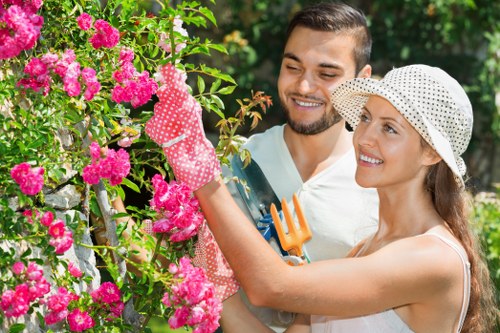
Garden maintenance is essential for keeping your outdoor spaces in Hackney vibrant, healthy, and inviting. Whether you have a small balcony garden or a sprawling backyard, regular upkeep ensures that your plants thrive and your garden remains a picturesque sanctuary amidst the urban environment.
Hackney’s unique climate and urban setting present specific challenges and opportunities for garden enthusiasts. Understanding the best practices for garden maintenance in this area can help you achieve a lush, sustainable, and beautiful garden all year round.
In this article, we will explore the key aspects of garden maintenance in Hackney, offering practical tips and insights to help you create and maintain a stunning outdoor space.
Understanding the Hackney Climate
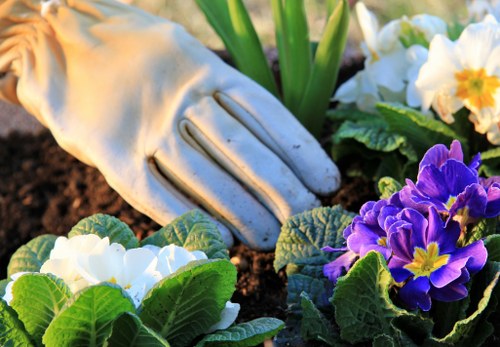
The climate in Hackney is characterized by mild winters and warm summers, with moderate rainfall throughout the year. This humid environment is conducive to a wide variety of plants, but it also means managing moisture levels and preventing plant diseases.
Microclimates within Hackney can vary significantly, especially considering the area's diverse range of urban green spaces. Factors like sunlight exposure, wind patterns, and soil quality all influence how your garden will perform.
To optimize your garden's health, start by assessing your specific microclimate. Observe how different areas of your garden receive sunlight and shade, and take note of wind corridors or areas prone to frost. This information will guide your plant selection and maintenance strategies.
Essential Garden Maintenance Tasks
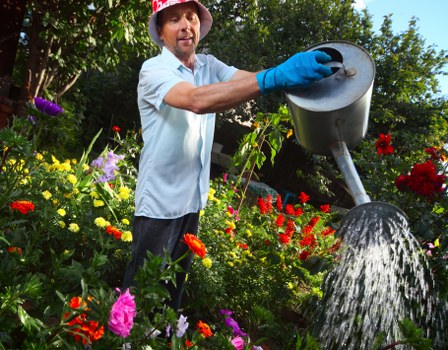
Maintaining a garden in Hackney involves a series of regular tasks that ensure your plants remain healthy and your garden stays aesthetically pleasing. Here are the essential maintenance activities you should incorporate into your routine:
- Pruning and Trimming: Regularly prune your plants to remove dead or diseased branches, encourage healthy growth, and maintain desired shapes.
- Weeding: Keep your garden free of weeds that compete with your plants for nutrients and water. Mulching can help reduce weed growth.
- Feeding and Fertilizing: Provide your plants with necessary nutrients through organic or synthetic fertilizers, tailored to the specific needs of each plant type.
- Irrigation Management: Ensure your garden receives adequate water, adjusting for seasonal changes and rainfall patterns.
- Pest and Disease Control: Monitor your garden for signs of pests and diseases, and take appropriate measures to manage them sustainably.
Seasonal Garden Care in Hackney
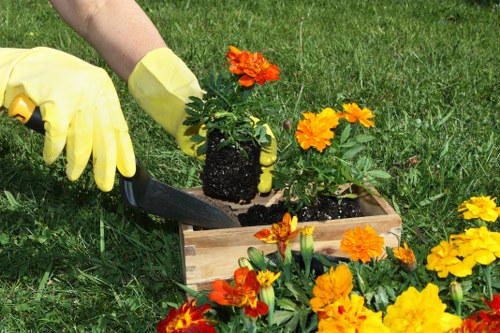
Each season brings its own set of challenges and opportunities for garden maintenance. Adapting your care routine to the changing seasons can significantly enhance the health and beauty of your garden.
Spring
Spring is the perfect time to prepare your garden for the growing season. Start by clearing out any winter debris and refreshing the soil with compost. This is also the time to plant new perennials and annuals, giving them a strong start before the summer heat arrives.
Summer
During the summer months, focus on maintaining consistent moisture levels and providing shade where necessary. Regularly check for signs of drought stress and adjust your irrigation practices accordingly. Additionally, keep an eye out for pests that thrive in warmer temperatures.
Choosing the Right Plants for Hackney Gardens
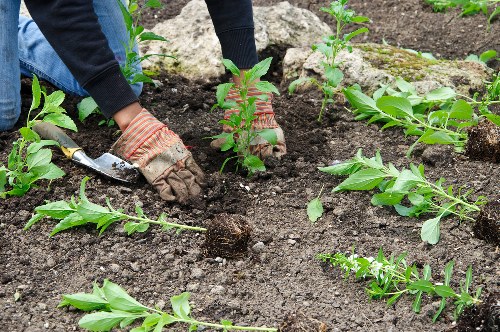
Selecting plants that are well-suited to Hackney’s climate and your garden’s specific conditions is crucial for successful garden maintenance. Opt for native and drought-tolerant species that can withstand the local weather patterns and require less intensive care.
Perennials such as lavender, hostas, and sedums are excellent choices for Hackney gardens. They come back year after year, reducing the need for replanting and ensuring a consistent garden appearance.
Additionally, incorporating a mix of flowering plants, shrubs, and trees can create a balanced ecosystem that supports biodiversity and enhances the overall appeal of your outdoor space.
- Lavender: Known for its fragrant flowers and resilience, lavender thrives in sunny spots with well-drained soil.
- Hostas: Perfect for shaded areas, hostas provide lush foliage and come in various sizes and colors.
- Sedums: These succulents are drought-resistant and add texture to garden beds.
Soil Health and Preparation
Healthy soil is the foundation of a thriving garden. In Hackney, urban soil can often be compacted or depleted of nutrients, so it's essential to invest time in soil preparation and maintenance.
Begin by testing your soil to determine its pH and nutrient levels. Based on the results, you can amend the soil with compost, organic matter, or specific fertilizers to improve its structure and fertility.
Implementing practices like mulching and cover cropping can further enhance soil health by retaining moisture, preventing erosion, and promoting beneficial microbial activity.
- Composting: Recycle kitchen and garden waste to create nutrient-rich compost that enriches your soil.
- Mulching: Apply a layer of mulch around your plants to conserve moisture and suppress weeds.
- Cover Cropping: Plant cover crops to protect the soil and add organic matter.
Irrigation Systems and Water Management
Effective irrigation is vital for maintaining a healthy garden in Hackney. With varying levels of rainfall and occasional droughts, having a reliable watering system can make a significant difference.
Consider installing an automated irrigation system that can be programmed to deliver water at optimal times, reducing waste and ensuring consistent moisture levels. Drip irrigation and soaker hoses are efficient options that target water directly to the plant roots.
Additionally, collecting rainwater through barrels or other storage systems can provide a sustainable water source for your garden, lowering your water bills and conserving resources.
Integrated Pest Management (IPM) Strategies
Managing pests is a critical aspect of garden maintenance in Hackney. Adopting an integrated pest management (IPM) approach helps maintain a healthy garden ecosystem while minimizing the use of harmful chemicals.
Start by regularly inspecting your plants for signs of pests or diseases. Early detection allows for prompt and effective intervention. Use natural predators, such as ladybugs and spiders, to control pest populations naturally.
If necessary, apply organic or eco-friendly pesticides as a last resort. Always follow the recommended usage guidelines to protect beneficial insects and maintain the balance of your garden’s ecosystem.
Pruning and Trimming Techniques
Proper pruning and trimming are essential for promoting plant health, encouraging growth, and maintaining the desired shape and size of your plants. Different plants require different pruning techniques, so it's important to understand the specific needs of each species in your garden.
When to Prune
The timing of pruning varies depending on the plant type. Generally, late winter or early spring is ideal for removing dead or damaged branches before new growth starts. For flowering plants, pruning after the blooming period can encourage a second display of flowers.
Pruning Tools
Invest in quality pruning tools, such as sharp shears, loppers, and pruning saws. Clean and sterilize your tools before each use to prevent the spread of diseases between plants.
- Shears: Ideal for trimming small branches and shaping plants.
- Loppers: Suitable for cutting thicker branches that shears cannot handle.
- Pruning Saws: Best for removing large or stubborn branches.
Mulching for Garden Health
Mulching plays a significant role in maintaining garden health by regulating soil temperature, conserving moisture, and preventing weed growth. In Hackney's climate, applying mulch can help protect plants during fluctuating weather conditions.
Organic mulches, such as wood chips, straw, and compost, enrich the soil as they decompose, adding nutrients and improving soil structure. Inorganic mulches, like gravel or plastic sheeting, can also be used for specific purposes, such as weed control in pathways.
Apply a 2-3 inch layer of mulch around your plants, ensuring not to pile it against the plant stems or trunks, which can cause moisture buildup and lead to rot.
Weed Control Strategies

Manual Weeding
Manual weeding is the most straightforward method of controlling unwanted plants in your garden. Regularly remove weeds by hand or with the help of tools like hoes and weeders to prevent them from establishing and competing with your desired plants.
Mulching
As mentioned earlier, mulching serves as an effective barrier against weed growth. By blocking sunlight and creating an inhospitable environment for weeds, mulch reduces the need for frequent manual weeding.
Herbicides
While chemical herbicides can be effective, they should be used sparingly and only as a last resort. Opt for organic or eco-friendly options to minimize the impact on beneficial insects and the overall garden ecosystem.
Fertilization and Soil Nutrition

Fertilizing your garden ensures that plants receive the necessary nutrients to grow strong and healthy. In Hackney, where soil may be compacted or nutrient-poor, regular fertilization is crucial.
Use a balanced fertilizer that contains essential nutrients like nitrogen, phosphorus, and potassium. Organic fertilizers, such as compost and manure, are excellent choices for improving soil fertility naturally.
Follow the recommended application rates to avoid over-fertilizing, which can lead to nutrient runoff and environmental issues. Incorporate fertilizers into the soil evenly and water thoroughly after application to help nutrients reach the plant roots.
Planting and Replanting Tips
Choosing the right time and method for planting can significantly impact the success of your garden in Hackney. Here are some tips to ensure proper planting and replanting:
- Timing: Plant during the appropriate season for each plant type. Spring and early autumn are generally ideal for most plants.
- Soil Preparation: Ensure the planting area has well-prepared soil, enriched with compost and free of weeds.
- Spacing: Provide adequate space between plants to allow for growth and air circulation, reducing the risk of disease.
- Watering: Water newly planted areas thoroughly to help establish strong root systems.
Regularly monitor your plants and replenish soil nutrients as needed to support ongoing growth and health.
Replanting Strategies
Replanting involves replacing old or overgrown plants to maintain garden aesthetics and health. When replanting, consider rotating plant locations to prevent soil depletion and reduce the risk of pests and diseases.
Assess the performance of existing plants and remove those that are underperforming or no longer complement your garden design. Introduce new varieties that offer different textures, colors, and growth habits to keep your garden dynamic and engaging.
Practical Garden Tools for Maintenance
Having the right tools is essential for efficient garden maintenance in Hackney. Investing in quality equipment can make your gardening tasks easier and more effective.
- Gardening Gloves: Protect your hands from thorns, dirt, and potential injuries while working in the garden.
- Hand Trowel: Ideal for digging, planting, and transferring small plants.
- Pruning Shears: Essential for trimming and shaping plants.
- Garden Hose: Ensure you have a reliable hose with adjustable nozzles for efficient watering.
- Lawn Mower: Keep your lawn neat and healthy by mowing regularly, adjusting the height based on grass type and season.
Maintain your tools by cleaning and storing them properly after each use to extend their lifespan and ensure effective performance.
Creating a Sustainable Garden

Sustainability is a key consideration in modern garden maintenance. Creating a sustainable garden in Hackney not only benefits the environment but also enhances the resilience and beauty of your outdoor space.
Composting
Composting kitchen and garden waste reduces landfill contributions and provides a natural fertilizer rich in nutrients. Set up a compost bin and regularly add organic materials like vegetable scraps, leaves, and grass clippings.
Rainwater Harvesting
Collecting rainwater for garden use conserves water and reduces your reliance on municipal supplies. Install rain barrels or other collection systems to capture and store rainfall.
Native Plant Selection
Choose native plants that are adapted to Hackney’s climate and require less water and maintenance. Native species support local wildlife and promote biodiversity.
Enhancing Garden Aesthetics
Aesthetics play a significant role in garden maintenance, making your outdoor space not only functional but also visually appealing. Here are some tips to enhance the beauty of your Hackney garden:
- Color Coordination: Plan your plantings with a color scheme in mind to create harmony and visual interest.
- Plant Variety: Incorporate a mix of plant types, including perennials, annuals, shrubs, and trees, to add texture and depth.
- Garden Structures: Add elements like benches, trellises, and garden art to create focal points and enhance the overall design.
- Pathways and Borders: Define garden areas with pathways and borders using materials like gravel, stone, or wood to organize space and add structure.
Regularly update and rearrange plantings to keep the garden fresh and dynamic throughout the seasons.
Maintaining Garden Structures
Garden structures such as fences, pergolas, and sheds require regular maintenance to ensure they remain functional and attractive. In Hackney’s urban environment, protecting these structures from weather and wear is essential.
- Cleaning: Regularly clean structures to remove dirt, moss, and debris that can cause deterioration over time.
- Repairs: Address any damage promptly, whether it’s fixing broken boards, reinforcing supports, or treating rust on metal components.
- Protection: Apply protective coatings like paint or sealant to wood and metal structures to shield them from the elements.
Properly maintained garden structures not only enhance the functionality of your garden but also contribute to its overall aesthetic appeal.
Lighting and Irrigation Enhancements
Adding lighting and irrigation systems can significantly improve both the functionality and beauty of your Hackney garden. Thoughtfully designed enhancements create a welcoming atmosphere and ensure that your garden remains healthy and vibrant.
Garden Lighting
Strategically placed lighting highlights key features of your garden, such as pathways, plant beds, and structures. Solar-powered lights are an eco-friendly option that reduces energy consumption.
- Pathway Lights: Illuminate walkways to improve safety and add a charming ambiance.
- Spotlights: Highlight specific plants or garden features, creating focal points in the evening.
- String Lights: Add a festive touch to seating areas and outdoor spaces.
Irrigation Systems
Efficient irrigation systems ensure that your garden receives consistent and adequate watering. Automated systems can save time and reduce water waste by delivering precise amounts of water based on plant needs and weather conditions.
- Drip Irrigation: Delivers water directly to the plant roots, minimizing evaporation and runoff.
- Sprinkler Systems: Suitable for larger areas like lawns, providing broad coverage.
- Smart Controllers: Adjust watering schedules based on real-time weather data, optimizing water usage.
Year-Round Garden Maintenance

Maintaining your garden throughout the year ensures its health and beauty, regardless of the season. Adopting a year-round maintenance routine helps you stay ahead of potential issues and keeps your garden looking its best.
- Winter: Protect plants from frost, prune dormant trees and shrubs, and prepare soil for spring planting.
- Spring: Clean garden beds, plant new growth, and address any winter damage.
- Summer: Focus on watering, weeding, and pest control to keep plants thriving during the hot months.
- Autumn: Harvest remaining produce, clean up fallen leaves, and prepare plants for the dormant season.
By staying consistent with your maintenance tasks, your garden will remain a lush and inviting space all year round.
Hiring Professional Garden Maintenance Services
If managing your garden maintenance in Hackney becomes overwhelming, consider hiring professional services. Professional gardeners and landscapers bring expertise, experience, and specialized tools that can elevate the quality of your garden care.
- Expertise: Professionals have in-depth knowledge of plant care, pest management, and garden design, ensuring optimal results.
- Time-Saving: Outsourcing maintenance tasks frees up your time to enjoy your garden without the stress of upkeep.
- Customized Services: Tailored maintenance plans can address the specific needs of your garden, enhancing its overall health and appearance.
Consider consulting with a local Hackney garden maintenance service to discuss your needs and explore how they can support your gardening goals.
Choosing the Right Service
When selecting a garden maintenance service, look for companies with positive reviews, relevant experience, and a comprehensive range of services. Ensure they understand the unique challenges of Hackney’s urban gardens and can provide personalized solutions.
Cost Considerations
While hiring professionals involves an investment, the benefits often outweigh the costs by saving you time and ensuring high-quality maintenance. Compare quotes from different providers and choose one that offers the best value for your specific needs.
Eco-Friendly Garden Maintenance Practices
Adopting eco-friendly practices in your garden maintenance routine contributes to a healthier environment and promotes sustainability. Here are some green gardening tips for Hackney:
- Use Organic Products: Opt for organic fertilizers, pesticides, and pest control methods to reduce chemical usage and protect beneficial insects.
- Compost: Recycle organic waste through composting, providing natural nutrients to your soil and reducing landfill waste.
- Native Plants: Incorporate native species that require less water and are naturally resistant to local pests and diseases.
- Water Conservation: Implement rainwater harvesting and efficient irrigation systems to minimize water waste.
- Green Mulch: Use natural mulches like wood chips or straw to conserve moisture and improve soil health.
Implementing these practices not only benefits your garden but also supports the broader environmental health of Hackney.
Conclusion: Achieving a Thriving Garden in Hackney
Garden maintenance in Hackney requires a blend of knowledge, dedication, and a willingness to adapt to the local environment. By following the tips and strategies outlined in this guide, you can cultivate a beautiful, sustainable, and healthy garden that enhances your home and contributes to the community’s green spaces.
Whether you manage your garden personally or enlist professional help, consistent maintenance is key to reaping the rewards of a flourishing outdoor sanctuary.
Ready to transform your garden into a vibrant haven? Contact us today to book your garden maintenance service and take the first step towards a stunning Hackney garden.

